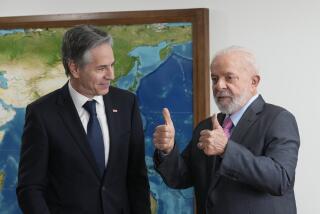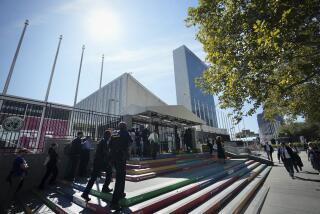U.S. left in the cold at G-20 summit
Reporting from Seoul — The United States apparently will have to go it alone in dealing with its fragile economy and near-double digit unemployment after the Group of 20 summit ended Friday with no commitment to immediate action to reduce trade and currency tensions.
A U.S. proposal to set numerical limits on trade surpluses and deficits was rejected. Leaders of the world’s 20 biggest economies pledged only to develop “indicative guidelines” to assess imbalances in the first half of 2011.
They also refused to endorse a U.S. effort to force China to raise the value of its currency.
“Any sense of global solidarity looks to have been yesterday’s story,” said Tim Condon, chief economist at ING Financial Markets in Singapore.
In their final declaration, leaders did pledge to work together and to refrain from protectionism and competitive devaluation of currencies. But the lack of speedy, specific actions on how to do so left the Obama administration — along with American workers, families and businesses — to shoulder the challenge and pain of trying to solve the nation’s economic problems on its own.
“Obama is now in a position where he must be prepared to act unilaterally to reduce the trade deficit and to shore up U.S. industrial and technological competitiveness or risk losing not only the presidency in two years, but also the American dream,” said Clyde Prestowitz, a former Reagan administration trade negotiator and now president of the Economic Strategy Institute in Washington.
There are several possible scenarios.
Exporting giants, including China, Germany, South Korea, and Japan, could still decide that it is in their interest to do more to bolster the American economy. If growth remains low, with the unemployment rate high and incomes stagnant, U.S. consumers could cut back on purchases of imported goods, which could hit the exporting nations hard because there are no alternative markets to absorb their output.
If demand for their products drops, the leaders who humbled Obama in Seoul might decide to take some action.
Another possibility is that American consumers will return to their free-spending ways, as a recent surge in imports suggest they might. That would mean more credit card and other debt, as well as the potential for another financial crisis, unless spending power also accelerated. But with the unemployment rate seemingly stuck near 10% and businesses guarding their profit margins, a hefty round of income increases looks like a long-shot.
A third possible scenario, perhaps the most likely, is that the U.S. economy will continue to struggle, growing slowly in a climate of widespread joblessness and belt-tightening for government and citizens alike.
Obama and the federal government could brighten future prospects by investing more in research and education to bolster the nation’s competitiveness in the global economy. But the benefits would be relatively long-term and would require new federal spending.
Given the prospect for partisan gridlock between the White House and emboldened Republicans in Congress, approval of such spending seems unlikely.
Even without congressional approval, Obama could still cite China as a currency manipulator if Beijing doesn’t move more quickly in adjusting its undervalued yuan. That would set in motion a process that could lead to sanctions. His administration could apply tariffs on certain imports, or undertake a Buy American program, as Ohio has done for government business.
But such actions are fraught with political as well as economic risks. As British Prime Minister David Cameron warned Thursday, the result could be a dangerous return to the 1930s, when trade barriers, currency wars and other selfish actions by nations was said to have prolonged the global depression.
Although nations now have the tools to defuse a standoff, the possibility of a currency war “absolutely” remains, Brazilian Finance Minister Guido Mantega said at the conclusion of the two-day summit.
Canadian Prime Minister Stephen Harper expressed similar concern, saying, “ G-20 credibility does depend on showing results.”
Obama sought to put an optimistic face on the talks.
“Sometimes I think naturally there’s an instinct to focus on the disagreements,” the president said, when in fact “in each of these successive summits we’ve actually made progress.”
He said there was not a lot of discussion about the Federal Reserve’s recent plan to pump $600 billion into the U.S. financial system, in effect printing billions of dollars to spur economic growth.
The move has been widely criticized abroad as a tactic to suppress the value of the dollar to help American exporters compete globally, though currency and other policies in the leading exporting nations are also designed to help their own economies.
America’s large public and fiscal deficit also drew fire, especially from fiscally conservative nations such as Germany, which resisted U.S. pressure for high-saving nations to step up consumption. Even stalwart allies Britain and Canada were reluctant to support stronger U.S. language in the declaration on rebalancing, given their own domestic commitments, however unpopular, to fiscal restraint.
“I think it was always clear that the G-20 would be able to do little concrete on the imbalances, and it has indeed kicked the problem down the road,” said Raghuram Rajan, a University of Chicago finance professor and former chief economist at the International Monetary Fund, which the G-20 has enlisted to help assess economic imbalances.
“The reality is that every large country will do what it thinks is best for its own agenda, and any help they offer one another will be indirect,” Rajan said.
“In the medium term, these agendas could converge, but the medium term is too long for political comfort.”
Ethan Kim in The Times’ Seoul Bureau contributed to this report.
More to Read
Inside the business of entertainment
The Wide Shot brings you news, analysis and insights on everything from streaming wars to production — and what it all means for the future.
You may occasionally receive promotional content from the Los Angeles Times.













